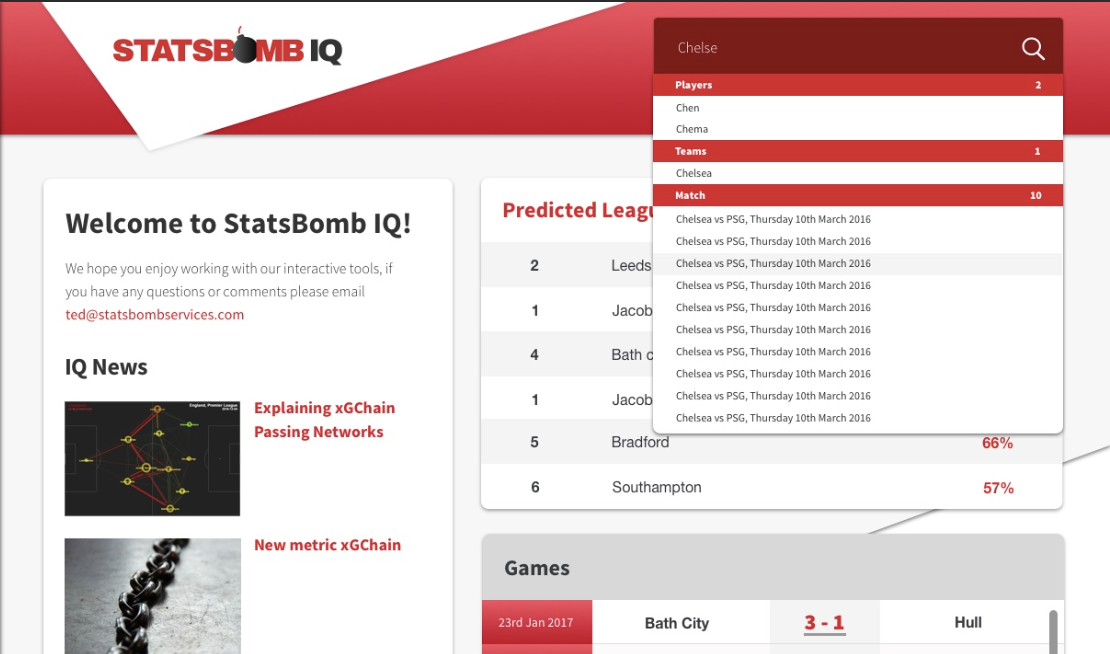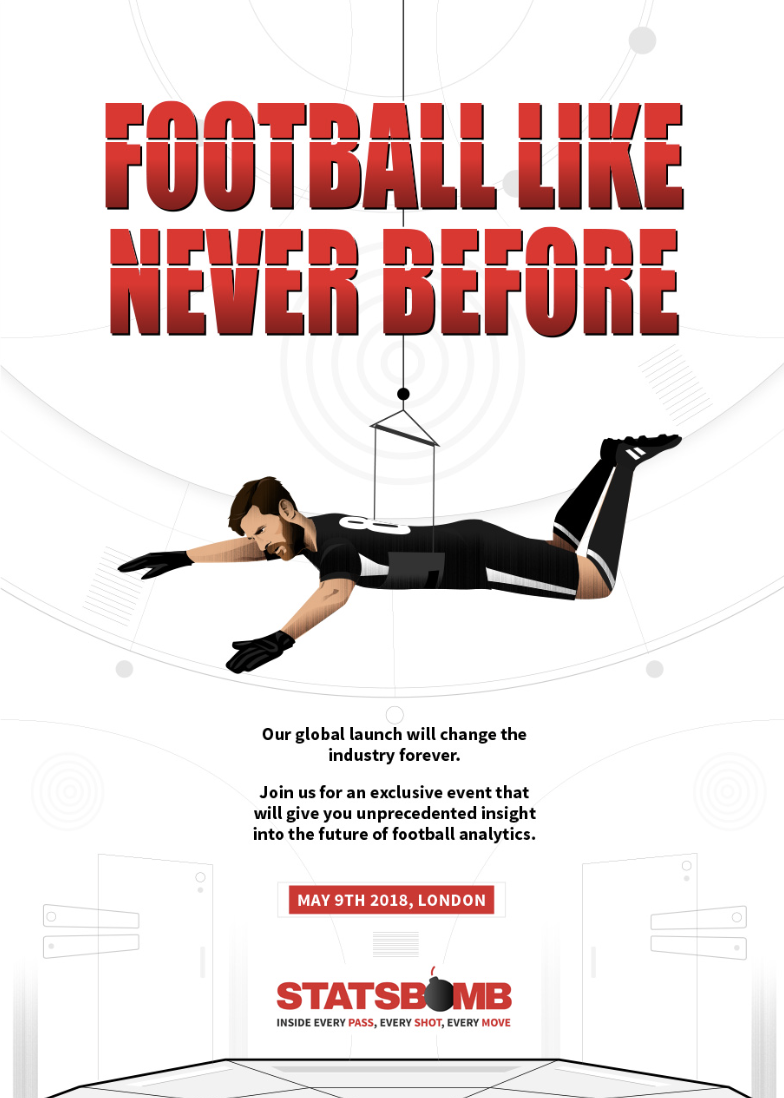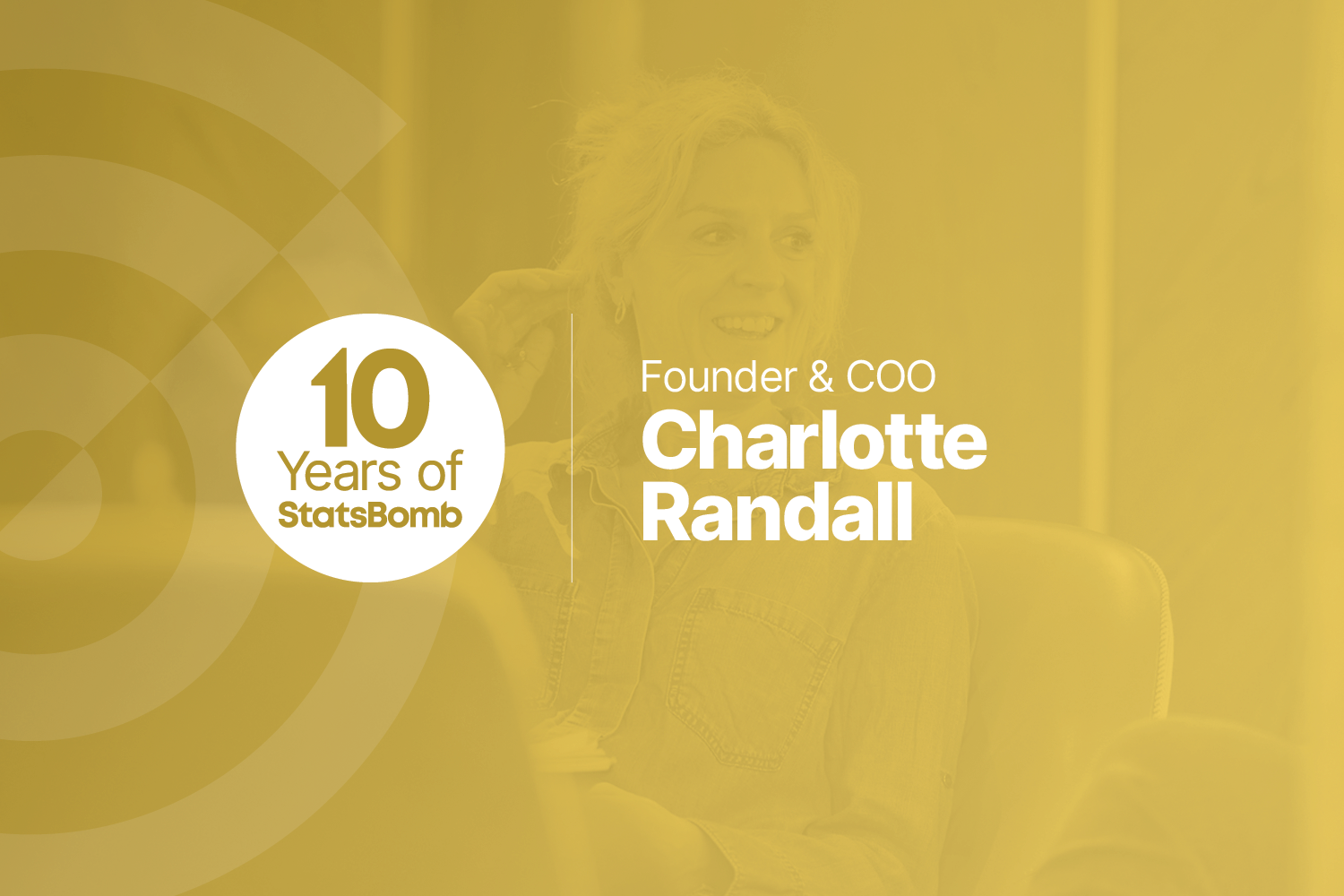An honest, no-stone-unturned interview with Charlotte Randall, COO and Co-Founder of StatsBomb.
Take us back to the early days. What was going through your mind when you co-founded StatsBomb?
Back in 2016, I worked for an Ed-Tech start-up and spent my evenings with Ted working on the StatsBomb website, customer proposition, product design and legal work. It rapidly became apparent that we needed to launch this company for real and dedicate ourselves entirely to give it a chance to succeed. I had decades of experience in product, management, finance, and marketing and had completely fallen in love with start-up culture, so it seemed like a no-brainer.
I went in with my eyes wide open. I knew I was letting myself in for a long, stressful, hard slog, but the opportunity and appeal of building cool products and a company were too enticing to pass up. Having worked in companies at all stages, from start-ups to global corporations, I wanted to build a company that fits with the modern world and that people would be excited to be part of.
How did you go about creating the culture at StatsBomb?
So much of our culture is founder driven and at the heart of the company. We're a tenacious bunch with passion for the industry and our products, and I think we've fostered an environment where everyone is encouraged to have ideas. Ideas happen every day across the company. We wouldn't be here today without every single person contributing so much of their time and energy constantly thinking of ideas and opportunities for improvement - whether its a new product idea, a new way to speed up data delivery, a new way of helping customers understand a new model, a new paternity/maternity policy or a new process for cost control.
I'm also very aware that this only happens when people feel safe verbalising their ideas. We often talk about it being ok to fail, and encouraging failure because how else do you learn - but the reality is that none of us are very good at this. We aren't taught how to fail at school or University or even when training in our early career. At least that wasn't the case for me in the noughties in my graduate training in London - I used to be really scared of making a mistake. We, the founder group, have tried to lead by example in this. I have definitely made mistakes. One of the worst hires the company has ever made was mine. A good learning experience but not without painful consequences that I openly talk to my team about.
Transparent, honest, kind, supportive, flexible, driven. These are all the things that I aspire for the company to be. I don't know that we fully succeed in all of this all the time, but I do know that overall our employees are happy; they have autonomy, flexibility and genuinely like their work and their colleagues. That's pretty amazing. I've worked in plenty of companies that say this is the culture but it just isn't the reality.

A screenshot from 2016 of the very first build of StatsBomb IQ, our advanced analytics platform.
What have you initiated that reinforces the culture at StatsBomb?
Company culture isn't something that you decide once -- it needs constant attention and effort. There are some initiatives that I set up at the beginning which have worked really well and are still important - like our 'bigupfriday' slack channel. My thinking here was that there is always someone to thank for something, so why not do it publicly? Now people post here every day, not just on Fridays. Another one is a 'Who Am I' slot where someone would give a short presentation on themselves each week. People covered all sorts about where they grew up, what their parents do for a living, their siblings, partners, children, hobbies, etc. It was a really great way to learn about our colleagues, especially when we were growing so fast, it was impossible to create relationships with everyone.
Another thing we did right from the very beginning, even when there was only about five of us, is have a Monday meeting where Ted, the CEO, gave an update on where we are and his focus for the week. As the company has grown, it has evolved in format, but we have always kept the weekly update meeting in the diary, and it's always been informal and real. We found this to be so important during the pandemic; everyone needs to know the voice and faces of their leadership team. Sometimes we would talk about our struggles, fears, or mental health. Sometimes it would be specific to a problem we were solving. But we always felt it was important for everyone in the company to know what the leadership are doing, their challenges, and what they are focusing on.
Flexible working conditions have always been core to the working environment at StatsBomb. It's one of the reasons I wanted to start my own company - to create a new normal way of working. With three kids, the youngest being just one year old when we launched StatsBomb, I needed flexibility. I had no issue working 60-70 hour weeks, but it was never going to fit into a 9-6 office schedule. I know that when I'm driven and have autonomy over my schedule, I'll get the work done when it suits me, and I wanted that to be the case for everyone else.
I want everyone to feel supported, appreciated, valued and heard. Keeping that going all the time, whilst working remotely, is challenging and needs constant attention. As soon as you take your eye off this, one of these important factors starts to slide.
We also set up an office in the UK, in Bath, two days a week, plus space for hot desking on other days. It's not compulsory to show up, but it's there for those who choose to. It's grown organically, and genuine friendships have evolved as a result. Even people who have left StatsBomb are still good friends with their colleagues and still socialise together. Our colleagues in Cairo have three offices, and the culture there is phenomenal. They have around 900 employees, most of whom need to be office based, so the challenges are very different. But with incredible leadership from Hesham Abozekry, who runs that operation, he has set the culture with his team leaders who emulate his values throughout the organisation. It's very impressive. I have learned so much about leadership from Hesham.
Tell us about some of the growing pains of scaling at StatsBomb.
There are so many growth phases, from scrappy start-up to professional organisation that operates at scale. I would say that scaleup in SAAS has three core growth challenges, and the faster you grow, the harder they become:
- Hiring is one of the most important and challenging things to get right. We've learnt the hard way that it's always better in the early days to hire the most senior person you can afford, as they will add value from day one and make life better for everyone. Sometimes you get lucky and hire more junior team members who turn out to be rockstars, but the impact on everyone else of the opposite happening is a big risk. Of course, as you grow you need to think about succession planning and career frameworks, which brings another set of challenges.
- Understanding when is the right time to build the support teams you need to function: HR, Marketing, Customer Success, Sales, Ops, Finance. We definitely left HR too late -- I would hire a solid HR/People Ops lead much sooner if I ever work in another start-up. In general, hiring takes far longer than you think and takes energy from everyone involved in reviewing CVs, interviewing, and onboarding, so get the senior roles earlier so they can take the load. This is hard and does depend on whether you're self-funded like we are or if you have VC backing, but you will always need more support teams and expertise than you think you will.
- Knowing when to refactor and when to re-build your tech for scale. In the early days, it's important to do things quickly and cut corners. Proving that elusive product-market fit is the goal, so tech debt exists from day one. Once you've proven you have that, you now have an even bigger problem - a product that everyone wants and has paid money for, but was built quickly and with corners cut! Managing this alongside hiring the support teams mentioned above is a constant negotiation and budgeting balance. I don't think there is a magic answer to this other than making sure you understand your costs and revenue in depth so that you know what levers you've got to play with and constantly staying on top of it.

The poster for the StatsBomb Data Launch from May 2018.
What are you most proud of?
Customer Success. This is one of the teams I have built from the ground up. The team is awesome, they work soooo hard and tirelessly to help our customers. But it's not just the team that I am proud of. It's the attitude which is a really integral part of our brand and has been since StatsBomb was a blog: our desire to help our customers to learn and to be successful in their job. It extends far beyond customer success into sales, marketing, customer ops, and our product and engineering teams. When customers choose to renew their subscription with us, which 95% of them do, it makes me very proud.
This also extends beyond customers: it's how we operate internally too. How teams help each other out and support each other in the highs and lows, and also how we work with partners and sponsors. Hopefully, if you've ever interacted with StatsBomb, you will have experienced this feeling!
What are you least proud of?
Part of being a (self-aware) control freak and perfectionist means there are many things I would like to do better!
We haven't quite got there yet in terms of joining up our teams across geographies. We were making real progress pre-pandemic, but since we had to stop travel and were also being careful with expenditure, things haven't been as joined up as I'd like.
I still cringe when I think of a significant product release we did back in 2018 that didn't go quite to plan. We had all sorts of tech issues that looking back weren't surprising as the whole thing was so ambitious, but it was also just before a really important holiday in the Egyptian calendar, and we had to call some people in to fix some critical bugs. It wasn't cool. At the time, we felt stuck and under pressure, but looking back, it pains me. I've been in product for 20 years, and I know better than to plan a release anywhere close to an important holiday! Needless to say, we are super strict on release timing now - both in terms of our employees' time and also from our customer's perspective.
What have been some of your biggest challenges personally?
I have definitely suffered from imposter syndrome throughout this journey. I think most of us have, at some point, founders and employees alike. At what point do you congratulate yourself for the things you have done rather than worry that you're not good enough? When you launch your first product, sign your first contract, sign your 100th contract, celebrate the company's first birthday, the fifth birthday, the tenth birthday? It's all real, all of these things happened, a large part because of my effort. I've spent a lot of time (and money) learning to accept and own this. Resigning from my role at Doodle, the Edtech company, to set up my own business - with my husband - was brave. Registering at Companies House was significant. Taking money from friends and family in the early days, and remortgaging my house, more than once, was terrifying.
All these experiences contributed to the passion, determination and sheer grit needed to drive a start-up. It's healthy to acknowledge them; we don't need to pretend we got here without them. Some of this is innate and part of my personality. I am a passionate person who takes risks and is comfortable with some level of chaos - I wouldn't have three kids otherwise! But a considerable part of this passion comes from the people I have surrounded myself with.
I have to mention working so closely with Ted, my husband. If anyone is reading this and thinking about going into business with their partner, please DM me, I can give you lots of practical tips! There are plenty of downsides, and the reality is that the company will too often take priority because it needs to. But there isn't anyone I would have wanted to share this journey with more than Ted. The journey isn't over, we have created the space to progress our individual careers, but nothing can erase the history and success that we have created together, and we'll both always be proud of that.
It's no coincidence that StatsBomb is turning 10 and I feel confident enough to own my seat at the table, write this article and share my vulnerabilities with anyone bored enough to read it.
What advice would you give to yourself 10 years ago?
- Believe you wouldn't be here if you couldn't do it. You can do it, and you already are doing it.
- Don't beat yourself up about all the articles you've read about how to do XYZ, you can't do everything at once. Even if you just pick one thing and do that well, that will make a difference.
- Do not try to prepare for Kat's quizzes, she's too good. 'Cheese or Paint'. Seriously!
